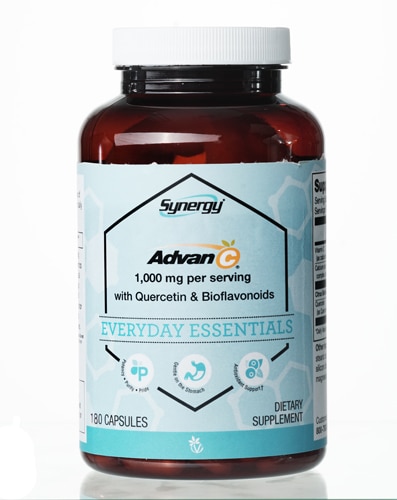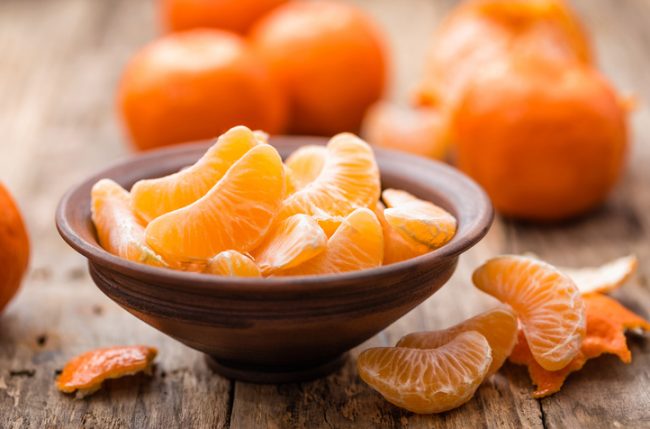Vitamin C is so prevalent and potent of a nutrient that it’s often considered the superstar of supplements. And for good reason: vitamin C is the go-to source for naturally supporting a healthier immune system.
But there’s much more to this citrusy vite than we realize. Here are five surprising things to know—and why you should consider adding more vitamin C to your diet:
1. Humans are one of only a few mammals that don’t produce vitamin C on their own
We have more in common with guinea pigs and bats than we think. Unlike dogs, goats, domestic cats and rabbits, humans don’t produce their own vitamin C.
Why? Blame evolution. Whereas this biological trait persisted in most animals, plants, and invertebrates, it disappeared in flying mammals, primates, guinea pigs and humans, rendering us incapable of synthesizing it from glucose in the kidneys or liver.
Translation? Taking a proactive approach to ensuring adequate intake of this vitamin is crucial, in that a failure to do so may lead to a deficiency.
2. Vitamin C is key to optimal adrenal health
Your adrenal glands—which are located at the top of your kidneys—are liable for releasing hormones that impact growth, development, cardiovascular function, and immunity. They also help you cope with fear and stress. Indeed, in our evolutionary history, the adrenal glands played a critical role in our survival. If a tiger chased you, your adrenal glands would release adrenaline—a stress hormone that aids in fleeing danger. Or, if a tiger stalked you, day after day, your adrenal glands would constantly release cortisol—another stress hormone that helps the body manage longer-term anxiety.
If your lifestyle today makes you feel as if you’re consistently being chased or stalked by a tiger (thanks to demanding jobs, children, economic uncertainties and daily anxieties), your adrenal glands will respond by producing more stress hormones, which eventually become depleted.
Vitamin C can organically support the rejuvenation of these glands. What’s more, vitamin C is essential to the manufacturing of adrenal hormones. And when your adrenal glands are functioning properly, you can see what those “tigers” really are—paper, and therefore tamable.*
3. It’s also key to a brighter, more luminous complexion
In the last decade, vitamin C-enhanced beauty products have been popping up in everything from anti-aging serums to skin-smoothing body butters.
Consider it far from a marketing ploy: vitamin C is vital to the production of collagen—a protein that gives skin its strength and tautness and which diminishes as we age, potentially resulting in saggy skin, fine lines and wrinkles and discoloration.
Additionally, vitamin C naturally encourages the rejuvenation of our complexions by operating as one of the most powerful and imperative antioxidants available. In essence, vitamin C donates electrons to molecules that are unstable—and thus harmful to the body—without turning into a pro-aging free radical. To put it plainly: vitamin C is a boon for both the way you feel and the way you look. (Grapefruit, anyone?)
4. Vitamin C naturally supports heart health
Vitamin C’s myriad benefits aren’t just reserved to your skin and immune system: vitamin C has many heart-protective properties and is one of the most valuable antioxidants in naturally supporting heart health.*
How? It can support good HDL cholesterol, thwart oxidation of “bad” LDL cholesterol and shield and strengthen the walls of your blood vessels. In fact, some researchers speculate that vitamin C may be just as fundamental to cardiovascular health as exercise.* Lucky for us: Getting more of this vitamin is as easy as peeling an orange. Which brings us to our next point:
5. Vitamin C is a water-soluble nutrient
Two types of vitamins exist: The first are fat-soluble vitamins—like vitamins A, D, K, and E—which are dissolved into the bloodstream to perform their functions; surpluses of these vitamins are then stored in the liver. Water-soluble vitamins, on the other hand, operate much like they sound—they’re dissolved in water, are not stowed in the body and are expelled through urine. Because of this, we need a continuous daily dose of these nutrients in our diets.
Supplements aside, vitamin C foods include citrusy fruits and their juices, enabling you to chow down on wholesome foods in the name of ensuring sufficient consumption of this nutrient. Strawberries, kale, broccoli, cantaloupe, red and green bell peppers, cauliflower, Brussels sprouts—all are wonderfully rich in vitamin C (and some contain higher doses of it than oranges!)
Go with an island-inspired breakfast: Papayas, pineapples, kiwi, mangos and guavas are all superb sources of this outstanding vitamin. Or, take it to Amazonian heights: camu camu—a small shrub found in the Amazon rainforest that produces cherry-like berries—is thought to have the highest concentration of Vitamin C on the planet. Who knew health would taste so delicious—and exotic?
*These statements have not been evaluated by the FDA. These products are not intended to diagnose, treat, cure or prevent any disease.




